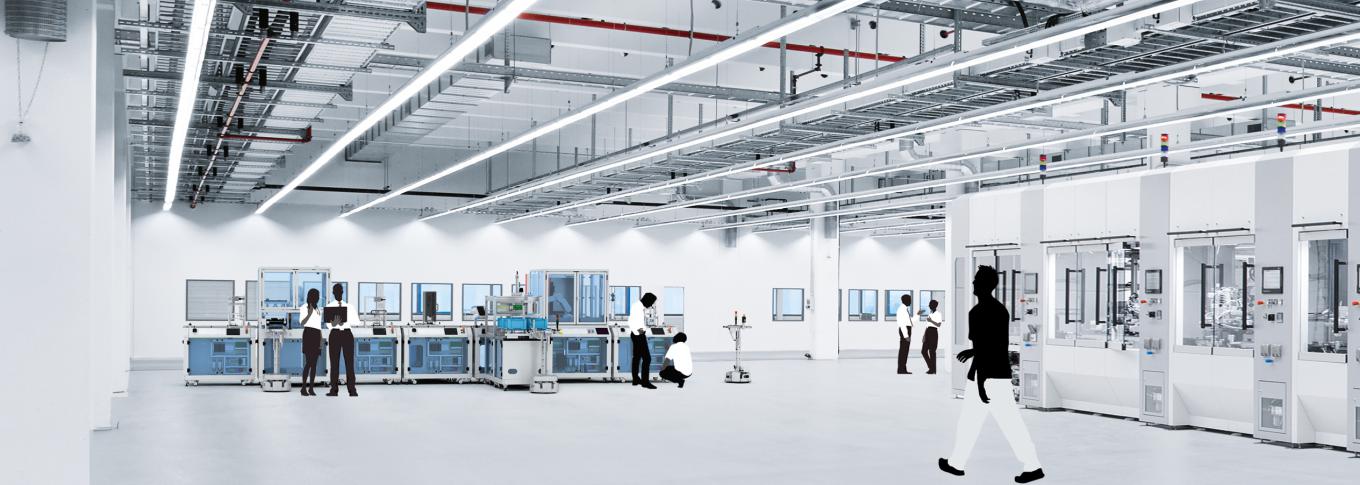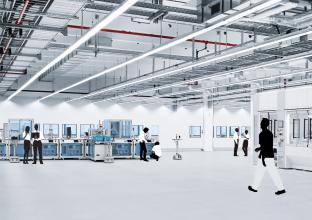
Industry 4.0 – Consequences for Education and Further Education
The enormous rise in the quantity of data and in the complexity of plant networks and company divisions makes it necessary to develop products that make the flow of data easy to project and to use – at production level, but also for training and developing workers’ skills.
For the operation and ongoing optimization of facilities, to maximize adaptability, and to develop flexible, intelligent components, one needs to communicate both a general understanding of digital, fully automated production technologies and in-depth knowledge of the structure and programming of digital facility networks.
Festo takes a holistic approach: The company’s international customers receive the newest networked automation technology with a maximum level of flexibility, safety and speed of delivery as well as full consultation and qualification services for “lean and digital production.” These services are modular in structure: The practical training in the use of new technologies is conducted using the cyber-physical research and learning platform “CP Factory”. The platform replicates the workstations of a real production facility and makes it possible to learn how to program facilities, set up networks and optimize many other aspects such as energy-efficiency and data management. In addition, the CP Factory can also be used to develop and test flexible software solutions prior to their implementation in practice in the production facility.
Learning factory
Staff training in learning factories increasingly requires a highly-flexible, work-integrated approach that relates to production needs and can be easily adapted to changing conditions. The subjects and skills taught need to be intuitive to learn and easy to share to facilitate networked learning.
The CP Factory is part of a so-called learning factory – a modular learning environment that can be used to qualify personnel in the operation of a particular production process or in a particular field of work, such as production technology. Different qualification modules can be added to the CP Factory: process-oriented training in the fields of mechatronics, logistics and process optimization as well as organizational and skills training in aspects such as interdisciplinary collaboration, learning capacity and adaptability.
In so-called “One-Point Lessons” skilled workers and management staff are trained at frequent intervals by internal or external experts in practical aspects of current requirements – for example in the fields of energy management, process optimization, IT management or in the training of skilled staff themselves.
Competency management
To strategically develop staff competencies in line with a company’s development strategy, and to exploit and develop these further for the future, it is important to know which competencies are relevant. The following questions play a key role in the development of a competency management system:
- Which competencies does a company need to reach its development goals?
- What role do managerial staff play in achieving them?
- Which functions and roles apply to the respective job descriptions?
- At what level of competence are the staff in their role? What would a 360-degree feedback look like?
- Competency development as a managerial instrument – what does that mean for me as a manager?
- Which didactic, theoretical and practical modules need to be applied to help promote staff in their self-development?
As an outsourcing partner to industrial companies and organisations, Festo Didactic offers solutions that are standardised and scalable worldwide, based on qualification requirement analyses, and tailored to a company’s needs or specific job profiles. From initial training and specialist, production-related advanced training to the development of training programmes and even turnkey learning centres, companies are able to purchase solution packages from Festo Didactic at their international production site and receive services in line with the latest education standards and technology.
The range of consulting services offered by Festo Didactic is developed in partnership with the technology factories in the Festo Group and include the strategic development of skills at industrial companies, lean management and process optimisation, as well as the integrated planning of factory areas. When it comes to planning and optimising processes, crucial factors are developing target value streams, deducing fields of activity and qualifying employees in a targeted manner. Particular attention is paid to corporate culture-related barriers to change, as every technical and logistical change process requires the individual and well-coordinated involvement of the employees.
费斯托 (Festo)是一家全球性的独立的家族企业,总部位于德国埃斯林根。自成立以来,Festo在工业自动化技术和技术教育方面制定标准,从而为环境、经济和社会的可持续发展做出贡献。公司为超过35个行业的30万家工厂和过程自动化客户提供气动和电驱动自动化技术解决方案,其中生命科学和实验室自动化业务受到越来越多的关注。Festo产品和服务遍布176个国家。2024年,费斯托在全球61个国家的250多个分支机构拥有约20600名员工,实现销售额34.5亿欧元。每年约8%的销售额用于研发。在这家学习型企业,1.5%的销售额用于基础和进一步培训。Festo 教学培训 (Didactic SE) 是全球领先的技术教育和培训供应商,为全球客户提供工业环境中全面的数字化和常规学习解决方案。

